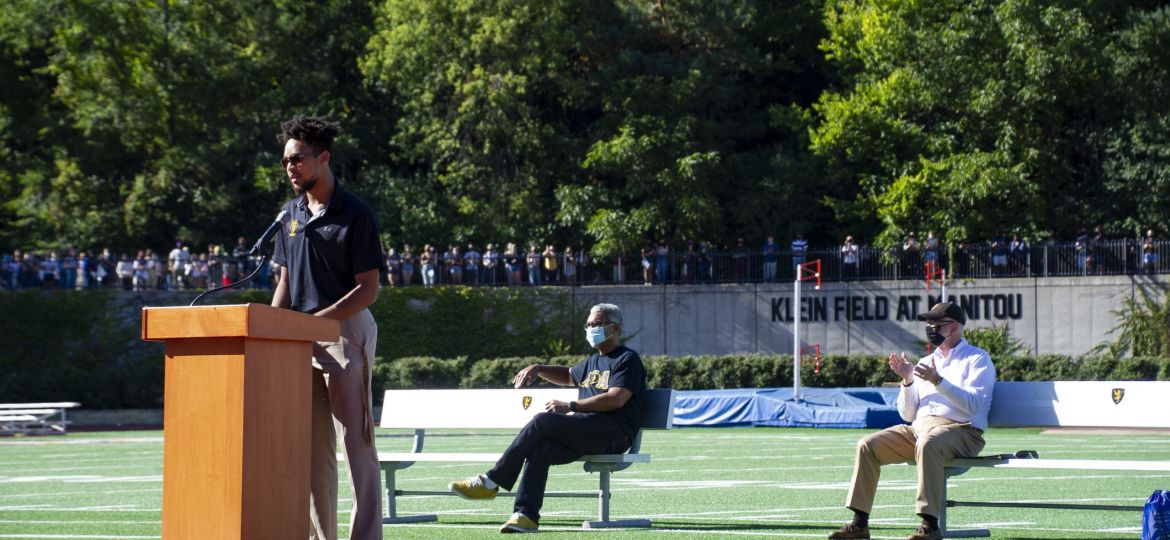
Leaders of Oles Against Inequality (OAI) invited collaboration with administrators, led by Vice President for Equity and Inclusion Bruce King, in planning the “7 Feet for 7 Shots” march on Friday, Sept. 4.
Aidan Lloyd ’24, a leader of OAI and organizer of the march, first reached out to María Pabón, director of the Taylor Center for Equity and Inclusion, on Tuesday, Aug. 25, to seek the Center’s support for the event. Pabón placed Lloyd in contact with Bruce King to advise the student leaders in planning the march.
OAI welcomed King’s advice, as they believed he could help facilitate administration’s presence at the event, according to Lloyd and Isaac Coutier ’21, a fellow leader of OAI and march organizer.
King reached out to OAI following the release of their first flier for the march on Saturday, Aug. 29. Leaders of OAI—Lloyd, Coutier, Jordan King ’22 and Vernon Green ’22—then met with Bruce King on Monday, Aug. 31, to discuss their plans for the event.
At this Monday meeting, King expressed reservations about the four demands included in the first flier for the march. According to sources in the meeting, King was surprised by the demands, which included curriculum assessments, hiring more BIPOC faculty and more proactive administrative response, and questioned the demands’ purpose.
OAI decided to remove the demands from the march and its publicity following the meeting. King and the leaders of OAI did not want to frame the march as a student versus administration issue, which they saw the demands as doing. The decision to remove the four demands was mutual between the two parties, sources in the meeting confirmed.
King and OAI also discussed speakers at the Monday meeting. OAI originally envisioned speeches from King and Vice President for Student Life Hassel Morrison, but King invited President David Anderson ’74 to speak as well, offering the opportunity to OAI over an email on Wednesday, Sept. 3. Leaders of OAI agreed.
Neither Anderson or Morrison had any contact with OAI before the march. Morrison did not end up speaking.
Anderson has received extensive community backlash following his speech at the march. Students and faculty have argued that Anderson, along with King, co-opted the march and used it as publicity for administration’s supposed support of BIPOC students.
“I went to the event in the belief that there was going to be four people making very short speeches to encourage marchers and then we were all going to march,” Anderson said in an interview with The Messenger. “The invitation to me wasn’t, ‘there is going to be a protest and students are going to want you to listen to them and respond,’ that wasn’t what I was expecting.”
Along with co-opting, King received reproach for his involvement in the planning of the march.
“It was their event,” Bruce King said in an interview with The Messenger. “I never intended, and indeed never did, try and take it away from them. The administration had nothing to—it was still very much their event.”
King’s speech at the march also received criticism for its accusatory tone.
“What you heard in my tone was a growing concern that my message had to be clear and loud and direct,” King said in the interview. “The environment had changed and so did the tone of my comments, and I regret that. Anyone that was offended by my tone, I deeply, sincerely regret that.”
A week before the march, Pabón reached out to St. Olaf Marketing and Communications and Broadcast Media on OAI’s behalf. The leaders wanted to ensure the event received as much coverage as possible, but did not intend the stream to be archived, according to Lloyd—only that those not able to attend in-person be able to watch.
Broadcast Media live streamed the event and following march, opening the stream before assistant professor of music Tesfa Wondemagegnehu led the crowd in song. Broadcast Media cut the stream midway through a speech by Brianne Smith ’23, a member of the Cultural Union for Black Expression (CUBE).
Broadcast Media included a statement in the edited archive of the stream, “This portion of the event was not sponsored or planned by Oles Against Inequality,” directly before Joshua Wyatt ’21, a CUBE executive, took the microphone after Lloyd’s speech.
In the edited archive, Broadcast Media also offer a statement on why the remainder of Smith’s speech is not included—“The concluding portion of this speaker’s words are not available in this archive as they occurred during the period between when the live stream had been stopped and the march began.”
marand1@stolaf.edu
Reporting contributed by Lydia Bermel ’22
bermel1@stolaf.edu

